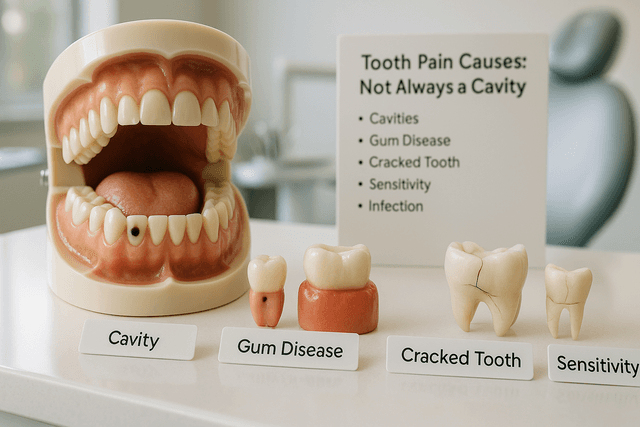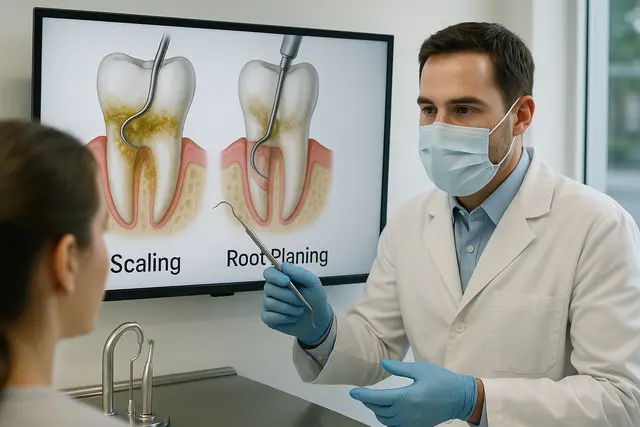General Dentistry
3 min read
Aug 25, 2025
Is Tooth Pain Always a Cavity or Could It Be Something Else?
Tooth pain can strike at the most inconvenient times, leaving you wondering what’s behind that sudden ache or sharp twinge. While cavities are a common culprit, they’re not the only reason your teeth might be hurting. Understanding the different causes of tooth pain can help you take the right steps toward relief and better oral health.

If you've ever felt a sudden zing in your mouth while eating or drinking, you've probably asked yourself, “Is this a cavity?” It's a fair question. Cavities are the go-to villain when tooth pain shows up, but here's the twist, not every type of toothache is caused by cavities.
Tooth Sensitivity Might Be the Real Culprit
When tooth sensitivity occurs, it can feel a lot like a cavity, especially when you're enjoying hot or cold food. That sharp pain can be a real buzzkill. Most often, sensitive teeth happen because the enamel, that hard protective layer of your tooth, is wearing away. Once the enamel thins, the layer underneath, known as dentin, gets exposed. That dentin is full of little tubules that lead straight to the nerves causing pain.
The cause of your sensitive teeth could be anything from:
Brushing too hard
Acid erosion
Good news? You can treat tooth sensitivity with the right toothpaste, better oral care habits, and a little help from your dental team.
Cavity Pain Isn’t the Only Kind of Toothache
Now, don’t get us wrong, if you might have a cavity, don’t ignore it. Cavities are caused by bacteria feeding on leftover sugars and creating acid that eats through your enamel. Small cavities can sneak by unnoticed, but eventually, you’ll feel it. Cavity pain often starts as a dull ache and turns into that unmistakable sharp tooth pain when biting down.
But it’s not always a cavity. A cracked tooth, for example, can mimic cavity pain. You’ll notice discomfort when you bite or chew, and sometimes even when you’re not doing anything at all. Ouch.
Dental Problems That Can Cause Tooth Pain
Here’s the kicker, there are many possible causes of tooth pain beyond cavities. If your upper teeth on both sides hurt, it could be a sinus infection playing tricks on your face. Tooth grinding (especially at night) can lead to jaw pain, tooth enamel damage, and, surprise, sensitive teeth.
An abscessed tooth, which is basically a pocket of pus caused by a bacterial infection, can cause severe pain and swelling. You may also notice fever or a bad taste in your mouth. That's your cue to see your dentist as soon as possible.
And let’s not forget gum issues. Gum disease, especially in its early stages, can cause toothache-like symptoms and sensitivity. Gum recession may also expose the roots of your teeth, adding to the problem.
Dentin and Enamel Are the Unsung Heroes
Enamel is the outermost layer of your tooth and is responsible for handling the majority of the force from chewing and biting. It acts as a tough shield, protecting the inner structures of the tooth from damage. However, enamel does not regenerate once it is worn away or eroded.
Beneath the enamel is dentin, a much softer and more sensitive layer that lacks the same level of protection. When decay or wear reaches the dentin, it can expose the tooth’s nerves, often leading to pain or sensitivity that signals the need for dental attention.
See Your Dental Professional for a Real Answer
To figure out its cause, you’ll need a conclusive diagnosis. Over-the-counter pain relievers might ease tooth pain temporarily, but if that pain persists, don’t wait. Schedule an appointment. A dentist can spot issues early, whether it’s a cavity, abscess, cracked tooth, or something sneakier.
Remember, it's not always a cavity. The cause of your tooth pain could be more than meets the eye. If you’ve got constant pain, pain when you bite, or even weird sensitivity, let a dental professional take a look. They’ve seen it all, everything from wisdom teeth acting up to strange cases of referred sinus pain.
Dental Care and Pain Relief Go Hand in Hand
Your oral health is too important to gamble with. Brush your teeth, floss like a champ, and don’t skip checkups. If you’re having symptoms of tooth decay, it could be time for a dental filling, or in worse cases, a root canal or even tooth extraction.
Professional treatment can make all the difference. Whether you need help with sensitivity or pain, pain relief, cavity treatment, or managing gum disease, the right dental care offers the relief you need and helps keep your healthy teeth happy.
Is Tooth Pain Always Caused by a Cavity?
Not always. While cavities are one of the most common reasons for tooth pain, they aren’t the only cause. Pain can also stem from worn enamel, gum disease, cracked teeth, or even non-dental issues like sinus infections. Because symptoms often overlap, only a dentist can confirm whether the source is a cavity or another condition.
What Other Dental Problems Can Cause Tooth Pain?
Tooth pain can come from a variety of conditions. Cracked teeth may hurt when you bite, while grinding your teeth can wear away enamel and cause sensitivity. Gum disease can expose tooth roots, making them vulnerable to pain. More serious issues like abscesses, a pocket of infection, can lead to intense discomfort, swelling, and even fever if untreated.
Can Tooth Sensitivity Feel Like a Cavity?
Yes, tooth sensitivity is often mistaken for a cavity. When enamel wears down, the softer dentin underneath is exposed, which has tiny channels leading directly to nerves. This makes teeth react painfully to hot, cold, sweet, or acidic foods. While sensitivity doesn’t always mean decay, it still signals that your teeth need attention to prevent further damage.
When Should You See a Dentist for Tooth Pain?
If your tooth pain persists, worsens, or is difficult to pinpoint, it’s time to see a dentist. Over-the-counter pain relief may help temporarily, but it won’t address the root cause. A dental professional can determine whether you need a filling, treatment for gum disease, or another procedure such as a root canal. Early care prevents minor problems from turning into serious ones.
Read Next
Related Posts

General Dentistry
How to Stop Nerve Pain in Tooth: Fast Relief That Works
Tooth nerve pain can be one of the most intense and disruptive types of discomfort. It often strikes without warning and makes everyday activities like eating, drinking, or even talking feel unbearable. Understanding what causes this pain and how to manage it effectively is key to getting fast relief.
4 min read
Sep 15, 2025

General Dentistry
Can a Sinus Infection Make Your Jaw Hurt? Understanding the Connection
Jaw pain can be unsettling, especially when it seems to appear out of nowhere alongside a stuffy nose or headache. Many people are surprised to learn that sinus infections can cause discomfort that feels like it’s coming from the jaw. Understanding the connection between your sinuses and jaw pain is key to getting the right treatment.
5 min read
Sep 15, 2025

General Dentistry
What Is SRP in Dentistry? A Complete Guide to Scaling and Root Planing
When it comes to dental health, most people think regular cleanings are enough to keep their smile safe. But sometimes, what’s happening below the gumline needs more attention. Scaling and root planing (SRP) is a treatment designed to address gum disease at its source, protecting both your gums and teeth from long-term damage.
5 min read
Sep 10, 2025
Don’t have time to research every dentist around you?
See why 30k+ patients trusted us